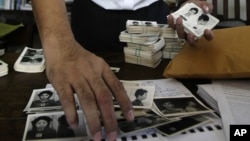WASHINGTON DC - The diary of a primary school teacher who was arrested by the Khmer Rouge and ultimately put to death sheds new light on the “dark days” of the regime.
Poch Yuon Ly, a former school inspector in Kampong Chhnang province, started writing his diary on a notebook in Oct. 28, 1975. The entries end abruptly less than two weeks later, when he was arrested and imprisoned, suspected as a soldier in the regime of Lon Nol.
The diary was recently given over to the Documentation Center of Cambodia.
In an interview with VOA Khmer, Poch Yuon Ly’s daughter, Poch Piseth Neary, called the diary, “the only valuable asset my father left me.”
“He said he could not live in a society that killed people and removed intellectuals from office,” she said. “He knew he would not be able to survive, so he wrote it up to keep his memories for his children, on how he struggled to study and build a family.”
Poch Yuon Ly apparently was able to write in his diary as he took leave from hard labor under the regime, due to liver and stomach illnesses. He wrote what he saw in his final days.
“He said that at the time, it was like a dark world, where nothing could get in, not even a small bit of information, and that he could do nothing with his knowledge,” Poch Piseth Neary said.
It was she who took the journal of her father and hid it from the Khmer Rouge, placing it in abandoned jars outside her cottage. She turned it over to the documentation center earlier this month. “I now want our younger generation to know what happened in those days and how people lived back then,” she said.
Poch Yuon Ly, a former school inspector in Kampong Chhnang province, started writing his diary on a notebook in Oct. 28, 1975. The entries end abruptly less than two weeks later, when he was arrested and imprisoned, suspected as a soldier in the regime of Lon Nol.
The diary was recently given over to the Documentation Center of Cambodia.
In an interview with VOA Khmer, Poch Yuon Ly’s daughter, Poch Piseth Neary, called the diary, “the only valuable asset my father left me.”
“He said he could not live in a society that killed people and removed intellectuals from office,” she said. “He knew he would not be able to survive, so he wrote it up to keep his memories for his children, on how he struggled to study and build a family.”
Poch Yuon Ly apparently was able to write in his diary as he took leave from hard labor under the regime, due to liver and stomach illnesses. He wrote what he saw in his final days.
“He said that at the time, it was like a dark world, where nothing could get in, not even a small bit of information, and that he could do nothing with his knowledge,” Poch Piseth Neary said.
It was she who took the journal of her father and hid it from the Khmer Rouge, placing it in abandoned jars outside her cottage. She turned it over to the documentation center earlier this month. “I now want our younger generation to know what happened in those days and how people lived back then,” she said.




